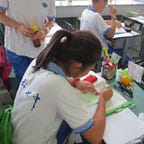Late at night I think of Juliu River and Juliu River. I prefer to call her the Liao River.
I was born by the Liao River, and the first page of the old photo album is a little girl wearing a red flower jacket and some duct tape because of her strange ears. My grandmother always brought up the little girl who didn’t remember a thing, saying that she would lean on the doorstop saying “let’s go shopping” and wait for nothing but a pair of big hands to take her away from this warm nest.
In winter, my grandmother would hold my little hands and slide on the ice inch by inch, waiting for the stars to come out before pacing back from Henan to Hebei. The stars on the Liao River are always so bright that they are the image of the hometown in everyone’s heart. I learned to look up at the starry sky too early, but my anticipation of seeing the stars were gradually wore off by the purple-red haze from the buildings in the south of the city — I became one of those city dwellers who only recognized Jupiter.
I spent many summer and winter vacations following my grandmother on the two yuan ferry from Henan to Hebei. The old courtyard in Hebei was still my paradise: only the Spring Festival on the bed seemed to be the real Spring Festival, with adults working all afternoon making dumplings and fish, and me scurrying around making troubles. I was not sure if the dumplings were really sweet or not, but those wrapped with coins were never my cup of tea. The Spring Festival Gala back then was always a blast, even though the TV was no bigger than the one screen in the lab today.
Later, I saw the Liaohe Bridge going up, and I didn’t like to go to Hebei any more-it was no different from any arduous journey, and the destination seemed to be such a shabby place again. That year, when the Liaohe Bridge was first opened for traffic, my grandfather, who was pushing a cart to get to the market, was photographed by the reporters and made it into the Liaohe Daily for the first time. I blithely followed the pace of adults and began to yearn for modernization, comparing the small town with the bustling Dongchengen Street in my mind countless times.
My uncle’s boat had been changed several times, and I was promised to go out with it once before, but had to cut it off because of the approaching typhoon. That day, I brought my kindle and phone with less than 10% battery life on board, bowed myself to the stairs and barely stretched out on the bed, suddenly wishing that it would get dark sooner and the dawn would come earlier. I was terrified of the dim light and the out-of-control isolation of the cabin. As soon as the ship docked, I jumped on deck and jumped off again, hating myself for my hypocritical and superficial curiosity.
Until I went back last year, my grandmother’s new home, where she had lived for almost ten years, no longer had frozen pears hidden on the balcony, and she stopped making me another skin jelly because once I left half of the plate untouched. That day I sat in my uncle’s bumpy car I held up the cell phone makingg time-lapse photography all the way, only surprised to find out, once colorful windshields, lanterns, fruit trees are gone, red or blue wooden frame always hanging snacks of various colors where the kiosk, people wearing flower clothes, colors, how are all gone. It was full of the rough, yellow-brown color of the dirt after a rain, the yellowish color of the haystacks, the gray-green color of the weeds that never stood out, the faded glass of the gray walls, and the traces of rice glue and untorn paper on the iron gates.
My paradise was gone. Before realizing my obsession with small-town youngsters and “the fierce animals”, I had spent a long time trying to piece together a complete spectrum of childhood. Lin Haiyin’s old stories of the south of the city, every time the winter chill came, I thought of Yingzi’s five-fingered gloves holding a steaming baked potato; Xiao Hong’s biography of the Hulan River, each and every childhood is riddled with the incomprehensive warmth of crazy men and women and the nostalgia of my grandfather; Ling Shuhua’s Ancient Rhymes, I was always curious about the birds in the cage; My Childhood, When I Was Young, City Gates Opened, the Dubliners, Miguel Street, and a few pages of Sherwood Anderson that I’ve not yet finished ……
Qi Bang Yuan’s Juliu River is deep and grand, flowing with the anguish and frustration of small individuals in big times and the rise and fall of family and nation. My Juliu River was renamed Liao River long ago, and Liao River is my mother river. To the north of the river is Hebei, where I was born, and south of the river is Henan, which is now also crowded with skyscrapers and is my new hometown. There used to be a lot of fish swimming in it, and a lot of boats docked at the shore, but now the fish are hidden in the distance, and the boats are following them afar.
在深夜想起《巨流河》与巨流河。我更爱叫她辽河。
我是辽河边出生的孩子,老相册的第一页是个因耳朵长得奇怪要粘些胶布、穿着红色花袄的小姑娘。姥姥总爱提起那个不记事的我,说是叉着腰往门口一站“逛街呀”,就浑得啥也不愿听,只等一双大手牵我离开这暖窝。
童年记忆里的辽河总是宽得没边,冬日里姥姥拉着我的小手在冰面上一寸一寸滑着挪着,却好像等星星都出来了才从河南踱回河北。辽河上的星星总是很亮,是每个人心底故乡的模样。我过早地学会了仰望星空,却也被城南楼宇见紫红色的霾逐渐消磨了期待,成为了那些只认得木星的城里人。
之后的许多寒暑假也跟在姥姥身后坐两块钱的大渡轮从河南到河北。河北的老院儿依然是我的乐园,而炕上的春节似乎才算真正的春节,大人们忙活一下午包饺子做鱼,我窜来窜去惹不少祸。印象里只吃过一次包着糖的饺子,我还咂巴着嘴不敢确定是嘴甜还是饺子甜,包了硬币的则从与我无缘。那时的春晚可真好看,就算电视大不过实验室里的一面显示屏。
后来眼见着辽河大桥汹汹立起,我也不再爱往河北去 — — 和任何一趟舟车劳顿的旅程没有什么区别,目的地似乎又是这么个破败的地方。那年辽河大桥初次通车,推着车赶集的姥爷被记者拍到还头回上了辽河日报,也算是件家里的大事。我懵里懵懂地追随大人的步伐开始向往现代化,在心里无数次将小城与繁华的东城根街作比。
小舅的船换过几条,之前有次说好我随船出海,却因为台风将至只能作罢。那天我带着kindle和只剩不到10%的手机上船,躬着身子走楼梯又勉强在床上舒展开,突然希望天黑得再快一些,黎明再早到一些。舱内昏黄的光线与掌控之外的隔绝令我感到恐惧。船靠岸后我立即上了甲板又跳下了船,我为这虚伪而肤浅的好奇心恨自己。
直到去年回去,姥姥那住了快十年的新家阳台上已不再藏有冻梨,也因有回我剩了大半盘没吃完置气,姥姥再没给我做过皮冻;再回河北(我知道,就像许多再俗气不过的回归故里情节),老院儿已成为半个废墟,河北甚至被分到了隔壁的小城成了盘锦的一部分。那天坐在小舅颠簸的轿车上我举着手机延时摄影了一路,只是讶异,曾经五颜六色的风挡春联灯笼果树都到哪里去了,红色或蓝色木框总是挂有各色零食的小卖部到哪里去了,穿着花衣服的人呢,颜色呢,怎么都没了。满眼都是粗暴的,雨后泥土的黄褐色,干草垛的枯黄色,杂草那从不引人注目的灰绿色,灰白的墙面玻璃褪色的铁门和铁门上米胶与没撕干净的纸留下的痕迹。
我的乐园没了。在觉察到对小镇青年和动物凶猛的痴迷以前,我曾花很长的时间试图拼凑一张完整的童年光谱。林海音的城南旧事,每每冬天寒气袭来我想到的还是英子露五根指头的手套和冒着热气的烤白薯,萧红的呼兰河传,每一份童年都匀了的疯男人疯女人和怀念一辈子的爷爷的温情,凌叔华的古韵,我也对笼里的鸟儿万分好奇;我的童年,小时候,城门开,都柏林人,米格尔街,还有手边只读了几页的小城畸人……
齐邦媛的《巨流河》是深沉的,宏大的,流淌着大时代下小人物的愤懑无奈与家国的荣辱兴衰。我的巨流河早改名成了辽河,辽河是我的母亲河。河的北面是河北,我出生的地方,河的南面是河南,如今也高楼林立,是我新的老家。曾经有很多鱼游在里面,很多船停靠在岸边,现在鱼藏在了远方,船也紧跟着开远了。
09/15/2020
